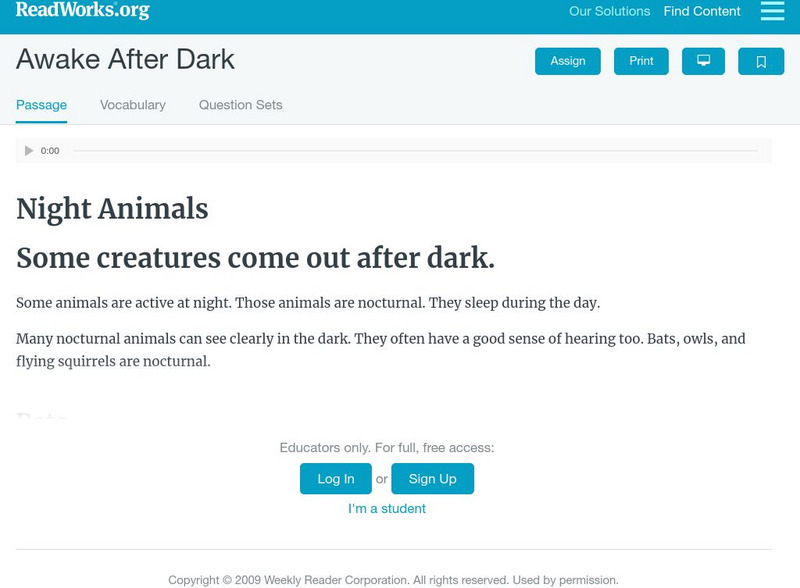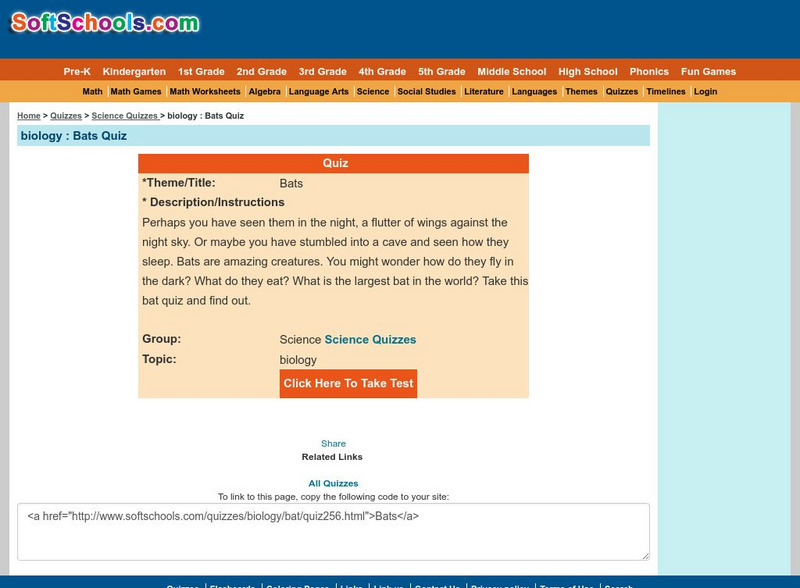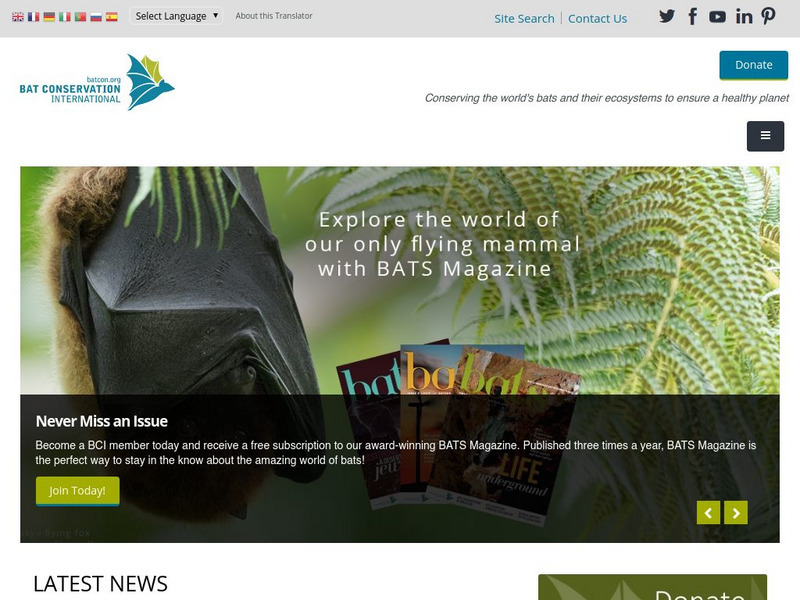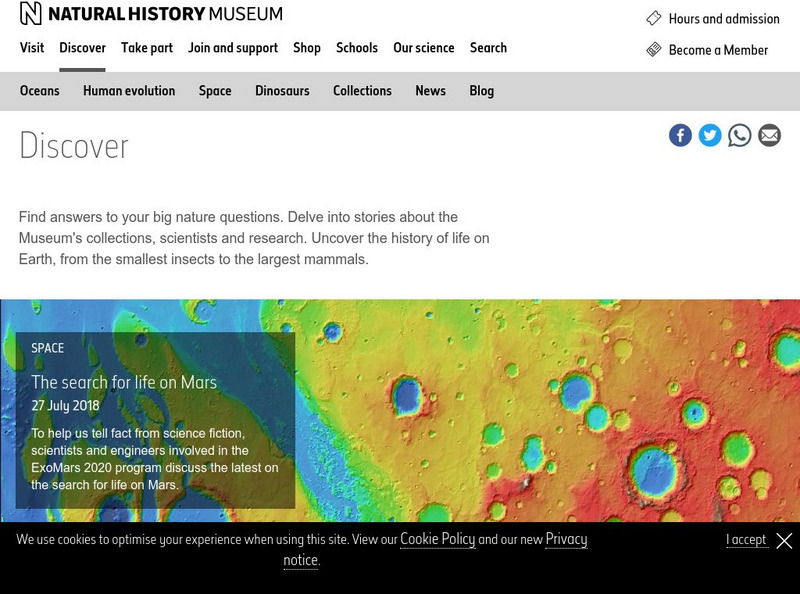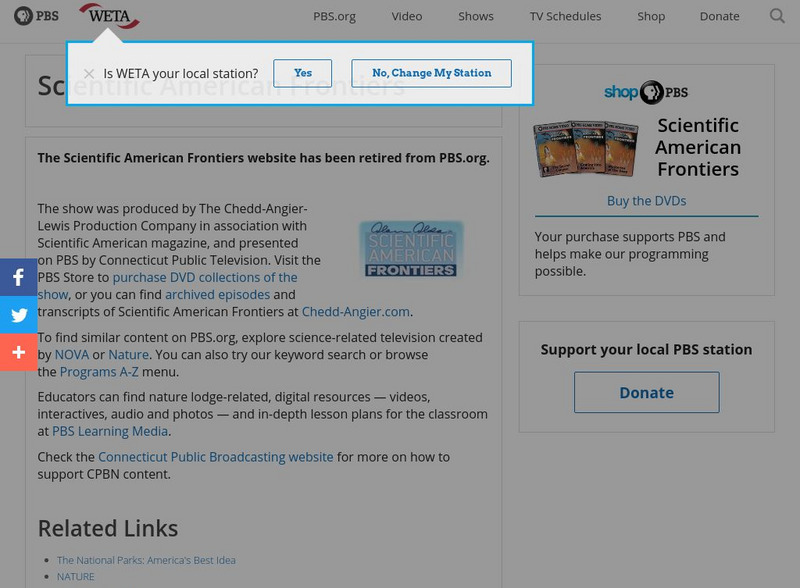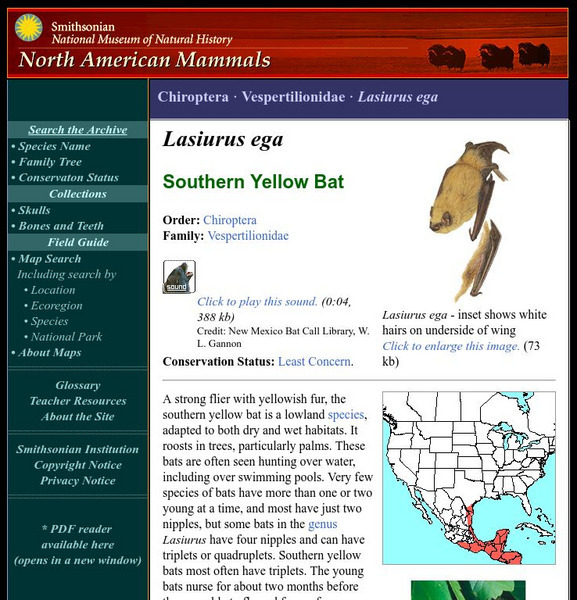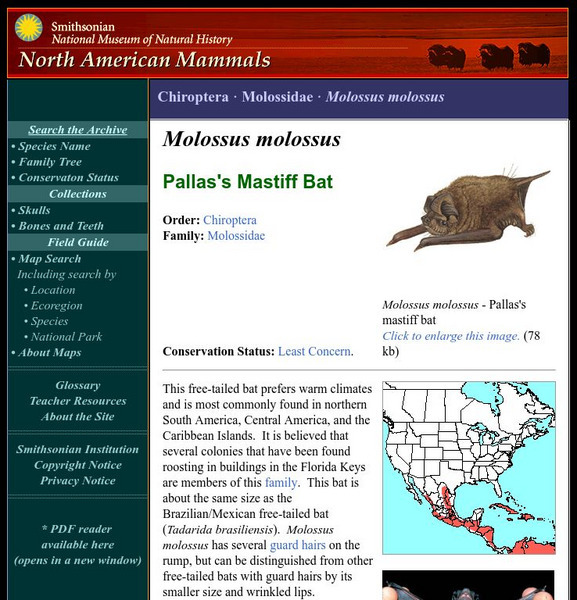Read Works
Read Works: Awake After Dark
[Free Registration/Login Required] An informational text about nocturnal animals. A question sheet is available to help students build skills in reading comprehension.
Read Works
Read Works: A Bat Mystery
[Free Registration/Login Required] An informational text about a fungus that is making bats sick. A question sheet is available to help students build skills in reading comprehension.
Read Works
Read Works: Hidden Habitats
[Free Registration/Login Required] A literary text about an endangered species of bats found in a cave in Oklahoma. A question sheet is available to help students build skills in reading comprehension.
Soft Schools
Soft Schools: Bats Quiz
Take this interactive, multiple-choice quiz over bats, then review your score and any missed questions at the end.
Other
Bat Conservation International, Inc.
This resource provides information about bats, and bat conservation.
Other
Contra Costa County Office of Education: Bats: Why Should You Care?
At this site, provided by the Contra Costa County Office of Education, you can get the facts on bats and their environment.
African Wildlife Foundation
African Wildlife Foundation (Awf): Bat
This resource takes an exploratory look at bats, the only mammals with wings and the ability to fly. Content includes information on bat physical characteristics, habitat, behavior, diet, caring for the young, predators, and more.
Natural History Museum
Natural History Museum: The Secret Life of Bats: Bat Senses
Part of an online exhibit on bats, this section focuses on bat senses: sight, olfaction (smell), echolocation, and hearing.
US Department of Agriculture
U.s. Department of Agriculture: Bats Can Be Farmer Friendly!
Learn about bats and how they are useful to farmers.
PBS
Nh Pbs: Wildlife Journal Jr: In Search of Bats
Follow a bat researcher through the attics and caves of New England to find out what happens when bat habitats dwindle. Learn about the threats bats face, the benefits they provide to our ecosystem, and how we can co-exist.
Alabama Learning Exchange
Alex: "Batty" About Bats!! (Reading)
As a part of a week-long unit about bats, the students will identify the characteristics of a bat and organize the facts using Think-sheets. Student understanding will be enhanced with the use of books, poems, lectures, discussions,...
Alabama Learning Exchange
Alex: 'Batty' About Bats!! (Writing)
As a part of a week-long unit about bats, the students will identify the characteristics of a bat and write an essay about bats. Student understanding will be enhanced through the use of books, poems, lectures, discussions, individual...
Alabama Learning Exchange
Alex: What Is Your "Bat"itude?
This lesson is for use at the beginning of a unit on bats to help determine learners' previous knowledge about bats as well as their bat attitudes. Students will begin by drawing an illustration describing their feelings about bats....
Alabama Learning Exchange
Alex: Going Batty
Students will participate in a research project about bats, which will culminate in a virtual field trip to discover more about bats. Students will collect information on the Internet using the Alabama Virtual Library and other...
Australian Broadcasting Corporation
Australian Broadcasting Corporation: News in Science: Bats Use Compass for Long Trips
From ABC News in Science, this article discusses research connected to the tracking of several big brown bats as they headed back to their homes. The experiment utilized several magnetic fields in attempts to disrupt the paths taken by...
Other
Canadian Wildlife Federation: Be Bat Friendly, Build a Bat House
Bats have been maligned for centuries, miscast as the familiars of witches, associated with Hallowe'en, and feared for the false belief that they will get caught in hair. Bats have been unfairly burdened with these myths, often reviled...
PBS
Pbs Teachers: Scientific American: Calls of the Wild: Bats and Echolocation
Explore bats' navigation systems by experimenting with echolocation. Approximate an object's distance by analyzing reflected sound waves, measuring the delay in sound and calculating the ratio to the speed of sound.
PBS
Pbs Teachers: Scientific American: Expedition Panama: Echoes in the Night
Explore your prior knowledge about bats and investigate bats' use of echolocation to identify and catch prey. Design a game like "Marco Polo" to demonstrate echolocation.
Nature Conservancy
Nature Conservancy: Pennsylvania: Richard O. Rowlands Preserve at Aitkin Cave
Highlights Richard O. Rowlands Preserve at Aitkin Cave, which is a haven for bats.
Smithsonian Institution
National Museum of Natural History: American Mammals: Southern Yellow Bat
A strong flier with yellowish fur, the southern yellow bat is a lowland species, adapted to both dry and wet habitats. It roosts in trees, particularly palms. Learn more about the Lasiurus ega, more commonly known as a Southern Yellow...
Smithsonian Institution
National Museum of Natural History: American Mammals: Pocketed Free Tailed Bat
A small fold, or "pocket" in the wing membrane of the free-tailed bat, near its knee, gives this bat its common name. Pocketed free-tailed bats have large ears and long wings, and fly rapidly, generally pursuing insects on the wing....
Smithsonian Institution
National Museum of Natural History: American Mammals: Pallas's Mastiff Bat
This free-tailed bat prefers warm climates and is most commonly found in northern South America, Central America, and the Caribbean Islands. It is believed that several colonies that have been found roosting in buildings in the Florida...


